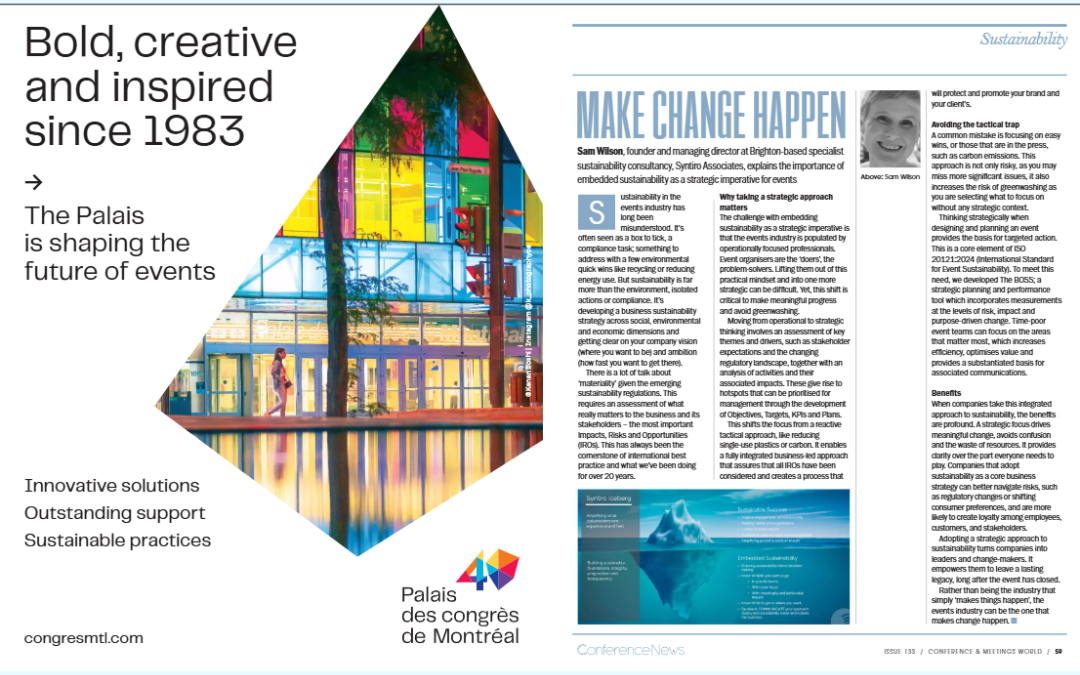Sam Wilson, founder and managing director at Brighton-based specialist sustainability consultancy, Syntiro Associates, explains the importance of embedded sustainability as a strategic imperative for events (this article was first published in Conference Meetings World)

Sustainability: A Holistic, Strategic Imperative for Events
Sustainability in the events industry has long been misunderstood. It’s often seen as a box to tick, a compliance task, or something to address with a few “quick wins” like recycling or reducing energy use. But true sustainability is far more than isolated actions or compliance. It’s about integrating a holistic strategy across the entire organisation, affecting everything from leadership to day-to-day operations.
This comprehensive approach requires strategic thinking and a deep understanding of material impacts; what really matters to the business and its stakeholders. Too often, businesses silo sustainability into comfortable, manageable areas, leaving the core operations untouched. But sustainability can’t thrive when compartmentalised. It has to touch every aspect of the organisation, ensuring that it aligns with long-term strategic goals rather than just short-term wins.
Why Taking a Holistic Approach Matters
The challenge with embedding sustainability as a strategic imperative is that the events industry is populated by operationally focused professionals. Event organisers are the “doers,” the problem-solvers. Their priority is delivering events on time and within budget. Lifting them out of this practical mindset and into one that is more strategic can be difficult. Operational teams are wired to execute, not necessarily to think in terms of long-term sustainability goals. Yet, this shift is critical if we want to see meaningful change.
When we help our clients move from operational to strategic thinking, we encourage them to assess their business holistically. This involves looking at the organisation’s wider impact—both positive and negative. A good starting point is evaluating the needs of all stakeholders, from the local community affected by event logistics to the employees within a client’s organisation. By identifying and engaging with these stakeholders, event organisers can map out risks and opportunities. This shifts the focus from “low-hanging fruit” like reducing single-use plastics to addressing more material concerns that can drive genuine change.
Avoiding the Trap of Low-Hanging Fruit
A common mistake companies make is focusing solely on easy, visible wins. For example, measuring carbon emissions is important, but it might not be the most pressing issue an event faces. More strategically, the company should look at its stakeholders and ask, “What do they expect from us? What are the real risks and opportunities here?” The answers to those questions are where the real impact lies.
We recently developed The BOSS – a strategic planning tool that encourages clients to think about sustainability on a macro and micro level. At the macro level, it considers the organisation’s overall impact on People, Profit, and Planet. At the micro level, it breaks down specific event-related risks, hotspots, and performance indicators. This allows companies to focus on areas where they can make the biggest difference and move beyond superficial actions.
The Benefits of a Holistic Strategy
When companies take this integrated approach to sustainability, the benefits are profound. A strategic focus not only reduces environmental impact but also strengthens the company’s long-term resilience. Companies that adopt sustainability as a core business strategy can better navigate risks, such as regulatory changes or shifting consumer preferences, and are more likely to create loyalty among employees, customers, and stakeholders.
Moreover, adopting sustainability as a holistic strategy turns companies into leaders and change-makers. This approach empowers them to leave a lasting legacy, long after the event ends.
Rather than being the industry that simply “makes things happen,” the events industry can be the one that makes change happen.

